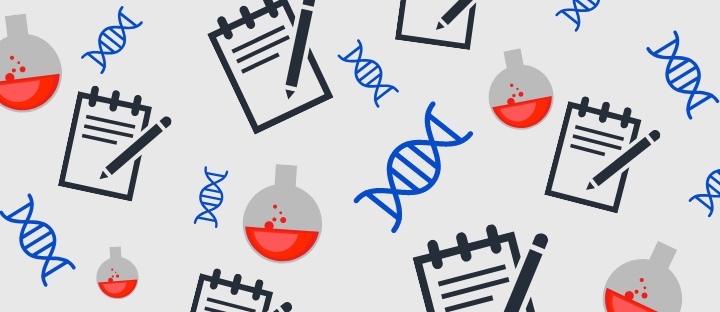#ScienceSaturday posts share exciting scientific developments and educational resources with the KAND community. Each week, Dr. Dominique Lessard and Dr. Dylan Verden of KIF1A.ORG summarize newly published KIF1A-related research and highlight progress in rare disease research and therapeutic development.
KIF1A-Related Research
Investigating genotype-phenotype relationship of extreme neuropathic pain disorders in a UK national cohort
Pain isn’t popular, but it’s an essential part of navigating our environment; it’s a signal that tells us when a location or activity is unsafe, and helps us learn so we don’t risk further injuries in the future. You can learn more about the complexity of pain sensation in the video below:
In pain disorders, this pain sensation isn’t informative or as accurate: People may experience pain even when there’s no injury or threat present, or fail to experience pain and take on unsafe behaviors.
Unfortunately, both ends of this spectrum have been observed in our KAND community, depending on mutation type. In this week’s article, researchers in the UK performed Whole Genome Sequencing on patients with neuropathic pain disorders to find potential genetic mutations. They identified many pain-associated genes, including KIF1A.
How is KIF1A related to pain sensation?
As the video above shows, pain signals travel through long neuronal axons. KIF1A is responsible for cargo transport down these axons, so it makes sense that KIF1A mutations could disrupt these signals. And a type of cargo KIF1A carries is closely tied to pain sensation.
Neurons receive sensory information through their receptors, which are like antennae that pick up specific radio signals – neurons are tuned differently depending on what senses they’re meant to pick up. Pain receptors are known to express a protein called TrkA. Mutations in the TrkA gene were also identified in this week’s study as a cause of neuropathic pain disorders. TrkA is also a known cargo of KIF1A, and KIF1A mutations have been found to impact the survival of TrkA-expressing neurons.
This study further highlights the need to research, understand, and treat pain disorders in KAND.
Rare Roundup
FDA hosts virtual conference for Rare Disease Week: “Intersections with Rare Diseases – A patient focused event”
This week was Rare Disease week, a time to highlight the hundreds of millions of patients affected by rare diseases globally, the challenges they face, and how to solve those challenges. To that end, the Food and Drug Administration hosted a virtual event to discuss and get feedback on finding treatments and cures for rare diseases. The program sessions included:
- Understanding Challenges of Clinical Trials with Small Patient Populations: A discussion. Our current medical system wasn’t built around rare diseases, so acknowledging and addressing challenges faced by small patient populations is an important step for improving that system.
- Initiatives to Advance Medical Product Development for Rare Diseases. As our medical and technological treatments advance, we have to balance the potential for breakthroughs with the vulnerabilities of patient communities.
- Engaging with FDA – Getting Connected. Staying Involved. This session focused on how patients and patient advocacy groups can work with the FDA, as well as how the FDA can better integrate patient-centered perspectives during drug development and approval.
- Spotlighting the Zebras: A Role for Medical Students in Shaping Rare Disease Care. A huge part of shortening the diagnostic odyssey and finding treatments for rare disease patients depends on a culture shift in how medical professionals interact with rare diseases; this begins with the way medical students are trained.
The event also highlighted the patient experience with a session on Rare Disease Stories, which you can watch below.

